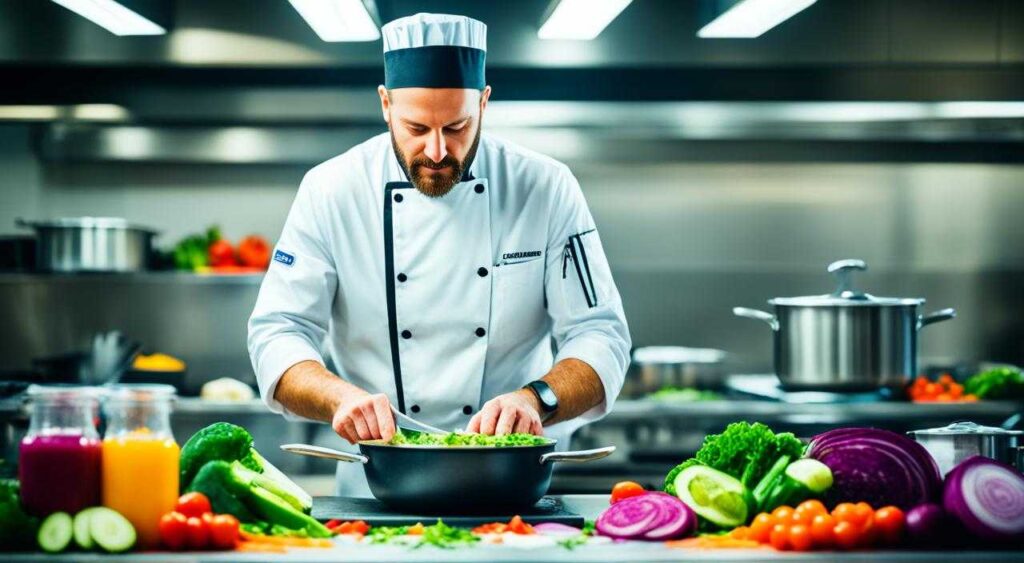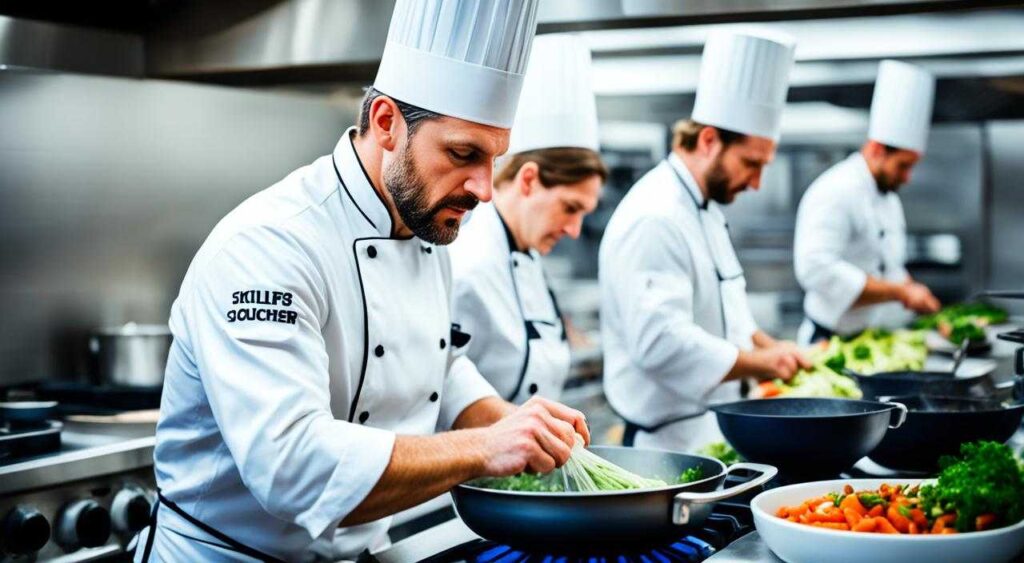Want to cook up a great career in kitchens but don’t have culinary school training? Don’t worry. Your love for cooking and wanting to be great can help you become a chef without a degree. The world of cooking loves those who are skilled, creative, and have real kitchen experience. Working in a kitchen gives you a lot of learning, just like formal school. For many top chefs, it was the most important part of becoming great.
Key Takeaways
- Practical experience can take the place of formal school for a cooking career.
- Knowing what the chef world expects and the many parts of being a chef is key to doing well.
- Without a degree, you can still become a chef by getting good at kitchen skills through real work.
- Becoming a chef without schooling means always learning more and getting better.
- Meeting people in the cooking world can give you chances like those from school.
The Reality of Culinary Careers Without Formal Education
Walking the culinary path without a formal degree offers unique opportunities. Many think you need a diploma for success in food. Yet, many chefs have risen to fame by relying on their drive, kitchen skills, and practical experience.
Understanding the Role and Responsibilities of a Chef
Becoming a chef is more than just cooking tasty dishes. A chef must create menus, manage costs, lead staff, and ensure food safety. These skills often come from direct work experience. Thus, starting a culinary career without a degree can offer true industry insight.
The Value of Practical Experience in the Kitchen
In a busy kitchen, instincts and skills are key. Chefs must make quick decisions and master flavor combinations. On-the-job training teaches what schools cannot fully. With experience, chefs build their reputations on real achievements, beyond just knowledge.

How to become a chef without a degree
The path to becoming a chef without a degree varies. Some cook up success with just their self-taught skills. We’ll compare learning methods and get inspired by top chefs without formal degrees.
Self-Taught Skills vs. Structured Culinary Education
Learning to cook on your own shows passion and dedication. You can use cookbooks, online tutorials, and food blogs. Still, formal education can make learning about food safety and kitchen management easier. Pros and Cons of Self-Teaching:
- Pros: Flexibility in learning, opportunity to develop a unique style, lower costs
- Cons: Possible gaps in knowledge, lack of formal credentials, limited networking opportunities
Benefits of Structured Culinary Education:
- Pros: In-depth and diverse curriculum, professional networking, mentorship opportunities
- Cons: Higher costs, time commitment, possible lack of real-world experience
Paths Taken by Renowned Chefs Who Skipped Culinary School
Many famous chefs reached the top without schooling. Their journeys show hard work, resilience, and a love for cooking. They show that success is possible without a degree.
| Chef | Experience | Signature Approach |
|---|---|---|
| Gordon Ramsay | Started with practical kitchen experience; worked under skilled mentors | Combines classic French techniques with British innovation |
| Rachael Ray | Built a food empire with her showmanship and culinary creativity | Focuses on quick, affordable meals for home cooks |
| Thomas Keller | Pursued apprenticeship in various esteemed kitchens | Emphasizes precision and technique in American and French cuisines |
In summary, reaching chef status without a degree can happen. It involves learning by yourself or finding apprenticeships. With resilience and creativity, you could become a legend in the food world.
Essential Skills for Aspiring Chefs
The path to becoming a chef involves learning cooking techniques. It’s also about mixing flavors and being creative. Having essential chef skills is key to success in the food world. Let’s look at the skills needed for top cooking and new ideas.
Mastering Basic to Advanced Cooking Techniques
To do well in cooking, knowing lots of cooking techniques is important. Chefs start with basic skills like using a knife, managing heat, and getting timings right. Moving on, they learn advanced stuff like cooking sous-vide, making dishes look good, and using cooking styles from around the world. This shows a chef’s skill and ability to do different things.
- Knife skills: precise chopping, mincing, and slicing techniques
- Heat control: sautéing, grilling, and simmering with skill
- Advanced techniques: sous-vide, fermentation, and molecular gastronomy
The Importance of Flavors and Creativity in Recipe Development
Mixing flavors right makes a chef’s food special. Knowing how flavors work together can make a meal amazing. Also, being creative helps chefs invent new food combinations. This can even start new food trends.
- Flavor pairing: combining ingredients to create new taste profiles
- Seasonal ingredients: maximizing the potential of in-season produce
- Innovative concepts: experimenting with unconventional ingredients and techniques
Every chef’s journey is different, but learning these skills is key for all. Whether making a classic dish or trying something new, knowing basic cooking methods and using flavors well is crucial for cooking great food.

Building Professional Experience in the Culinary World
The road to respect in the culinary industry is full of hard work and love for cooking. To become a top chef, you must take part in internships. Also, don’t miss any chance to show your skills in culinary competitions. These steps are key for new chefs’ growth.
Internships are super important. They bridge book learning and real kitchen work. They are places where future chefs learn from the best, get to know how a kitchen works, and get better at cooking. Internships also teach you about running a kitchen and improving your taste.
- Identifying top-notch dining establishments that align with your culinary vision.
- Reaching out to local chefs or restaurateurs to inquire about internship opportunities.
- Attending job fairs and establishing connections with culinary school representatives.
Competing in culinary competitions is great for chefs who want to get better while being watched. Competitions test many skills, like managing time, being creative, and staying calm. Winning or even just being mentioned can help your career. It shows you have real talent in cooking.
| Benefits | Challenges |
|---|---|
| Exposure to new techniques and culinary trends | Intense pressure and competition |
| Networking with industry professionals | Navigating the unpredictability of contest outcomes |
| Developing a competitive edge | Time commitment for preparation |
The food world always changes, and chefs need to keep learning. Building professional experience is a journey that never ends. Chefs must love learning, be creative, and always aim to be the best.
Mentorship and Networking: Connecting with Culinary Experts
Cooking is about finesse, skill, and also community, and guidance. A strong network and a good mentor can be key to a successful culinary career. Knowing the role of mentorship and the power of networking is crucial for chefs wanting to get better and advance their careers.
Finding a Mentor to Guide Your Culinary Journey
Getting a mentor in cooking can change your career. Mentorship speeds up learning and introduces you to new ideas. Start by finding experienced chefs who inspire you. Go to their events, connect on forums, and ask them for their guidance and wisdom.
Expanding Your Culinary Network through Industry Events and Forums
Events and forums are great for meeting other chefs. You learn new trends, make friends, and may find mentors. Look for gatherings like local taste tests or big cooking contests. These are great places to find a mentor and grow your network.
- Participate actively in culinary forums online to build relationships and showcase your passion.
- Volunteer at industry events to meet established chefs and culinary influencers.
- Join professional culinary associations to gain access to exclusive networking events.
Conclusion
Becoming a top chef without a degree takes hard work, complete dedication to cooking, and a real love for learning. This hard work forms the base of an exciting culinary career. It makes others respect you and makes people happy with your food. A formal culinary education isn’t always needed to be great in the kitchen. Instead, practical experience matters a lot, earned by working many hours behind the hotline.
Famous chefs around the world show that an alternative path is possible. They prove that with enough passion, lots of practice, and exploring different foods, you can become amazing. These food geniuses are great for inspiration. They show that with creativity, skill, and ambition, you can reach the top. And this is true even if you didn’t go to culinary school.
At its heart, becoming great at cooking is about being ready to learn, change, and be creative. Chefs need to grab chances to get better, network a lot, and learn from experts. Doing these things makes you better and opens doors to a great culinary career. It’s a journey all about flavors, techniques, and determination. It starts with a passion and comes to life on your plate.
FAQ
Can I become a chef without a degree?
You can become a chef without a degree. Culinary school helps but isn’t a must. It offers a full education and industry connections. Yet, getting hands-on experience is key to learning skills and understanding food better.
What are the responsibilities of a chef?
Chefs do more than cook. They plan menus, prepare food, and cook. They also manage kitchen staff and make sure food is safe and high-quality. Plus, they handle kitchen operations.
How can I become a chef without a degree?
To be a chef without a degree, explore different paths. Some teach themselves, while others take alternative culinary paths. Think about the benefits of teaching yourself versus formal education. Look at successful chefs who didn’t attend culinary school for inspiration.
What skills are essential for aspiring chefs?
Future chefs need to master cooking techniques. They should understand how flavors work and be creative in making recipes. Knowing and improving these skills is vital for making tasty and good-looking dishes.
How can I build professional experience in the culinary world?
To get professional experience, seek internships, apprenticeships, or jobs in restaurants. This hands-on experience is vital. Joining culinary competitions can also help. It gives exposure and networking chances.
How can I find a mentor in the culinary industry?
A mentor can speed up your culinary career. They offer advice and insights into the industry. Joining industry events and forums helps too. It grows your network and opens new doors.
What are the key steps to becoming a chef without a degree?
The main steps include learning vital skills, getting experience, and networking. Mix teaching yourself with some formal education. Finding a mentor is also crucial for a successful career in cooking.
